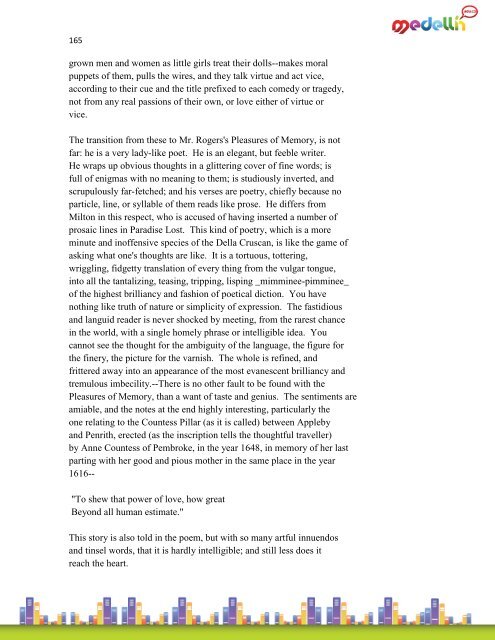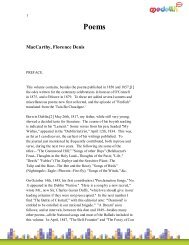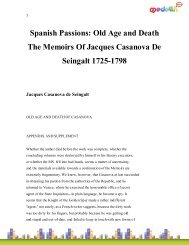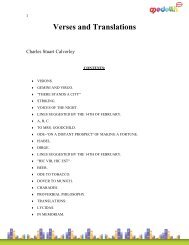Lectures On The English Poets William Hazlitt
Lectures On The English Poets William Hazlitt
Lectures On The English Poets William Hazlitt
Create successful ePaper yourself
Turn your PDF publications into a flip-book with our unique Google optimized e-Paper software.
165<br />
grown men and women as little girls treat their dolls--makes moral<br />
puppets of them, pulls the wires, and they talk virtue and act vice,<br />
according to their cue and the title prefixed to each comedy or tragedy,<br />
not from any real passions of their own, or love either of virtue or<br />
vice.<br />
<strong>The</strong> transition from these to Mr. Rogers's Pleasures of Memory, is not<br />
far: he is a very lady-like poet. He is an elegant, but feeble writer.<br />
He wraps up obvious thoughts in a glittering cover of fine words; is<br />
full of enigmas with no meaning to them; is studiously inverted, and<br />
scrupulously far-fetched; and his verses are poetry, chiefly because no<br />
particle, line, or syllable of them reads like prose. He differs from<br />
Milton in this respect, who is accused of having inserted a number of<br />
prosaic lines in Paradise Lost. This kind of poetry, which is a more<br />
minute and inoffensive species of the Della Cruscan, is like the game of<br />
asking what one's thoughts are like. It is a tortuous, tottering,<br />
wriggling, fidgetty translation of every thing from the vulgar tongue,<br />
into all the tantalizing, teasing, tripping, lisping _mimminee-pimminee_<br />
of the highest brilliancy and fashion of poetical diction. You have<br />
nothing like truth of nature or simplicity of expression. <strong>The</strong> fastidious<br />
and languid reader is never shocked by meeting, from the rarest chance<br />
in the world, with a single homely phrase or intelligible idea. You<br />
cannot see the thought for the ambiguity of the language, the figure for<br />
the finery, the picture for the varnish. <strong>The</strong> whole is refined, and<br />
frittered away into an appearance of the most evanescent brilliancy and<br />
tremulous imbecility.--<strong>The</strong>re is no other fault to be found with the<br />
Pleasures of Memory, than a want of taste and genius. <strong>The</strong> sentiments are<br />
amiable, and the notes at the end highly interesting, particularly the<br />
one relating to the Countess Pillar (as it is called) between Appleby<br />
and Penrith, erected (as the inscription tells the thoughtful traveller)<br />
by Anne Countess of Pembroke, in the year 1648, in memory of her last<br />
parting with her good and pious mother in the same place in the year<br />
1616--<br />
"To shew that power of love, how great<br />
Beyond all human estimate."<br />
This story is also told in the poem, but with so many artful innuendos<br />
and tinsel words, that it is hardly intelligible; and still less does it<br />
reach the heart.

















